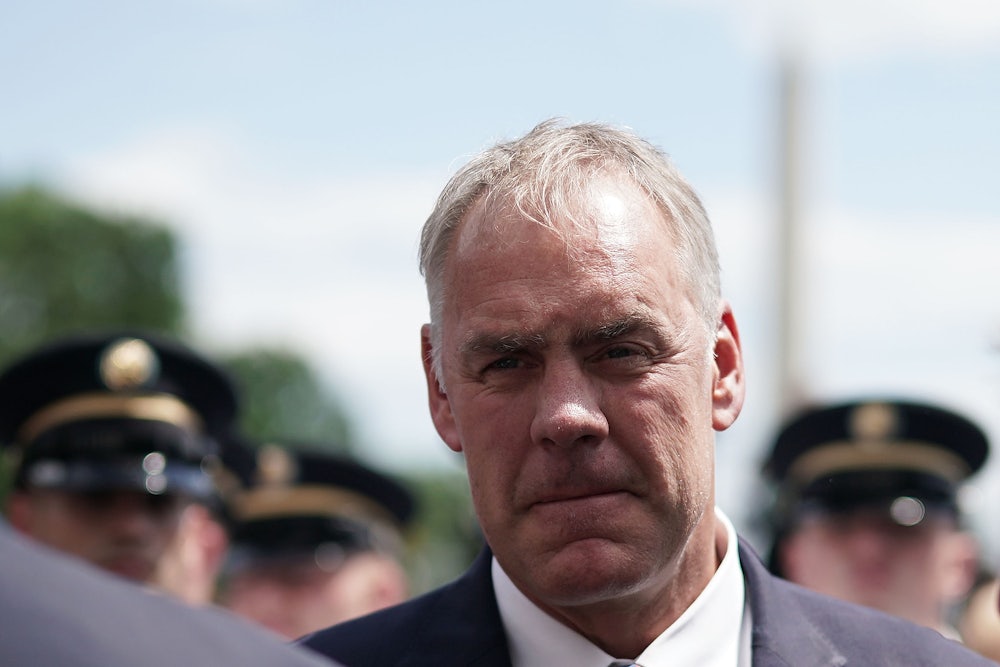After Scott Pruitt resigned from the Environmental Protection Agency this summer, many in the media—this reporter included—wondered whether Ryan Zinke might be the next to go. The Interior secretary was facing more than a dozen investigations over allegedly unethical and wasteful behavior at the agency.
Zinke’s fate, however, ultimately depended on the results of those investigations. So many were alarmed when The Hill reported on Tuesday that Zinke was getting rid of the person in charge of several of those inquiries—and would replace her with a Trump political appointee with no experience in government oversight.
The Hill’s information seemed pretty solid. It came from an email “Fond Farewell” and sent by Ben Carson, the secretary of Housing and Urban Development, to agency staff. “It is with mixed emotions that I announce that Suzanne Israel Tufts, our Assistant Secretary for Administration, has decided to leave HUD to become the Acting Inspector General at the Department of Interior,” Carson wrote. Though not explicit, this implied that Mary Kendall, who has served as the Interior Department’s acting inspector general for nearly a decade, would be fired or demoted.
The Washington Post, Outside magazine, and others soon picked up the news.
This is a very big deal. Politicizing the oversight function is dangerous, especially in the absence of any Congressional oversight. Changing IGs in the midst of multiple serious investigations of the agency's head should raise alarm bells everywhere. https://t.co/G8YvcRfX91
— Michael R. Bromwich (@mrbromwich) October 16, 2018
RM @RepRaulGrijalva, @RepMcEachin, @RepDonBeyer & @RepHuffman are urging scrutiny of the new @Interior Inspector General. It's deeply concerning that as IG this Trump appointee could interfere with the multiple Zinke Investigations currently underway. https://t.co/D2jQcFmjz3 pic.twitter.com/czpVYCggjV
— Nat Resources Dems (@NRDems) October 18, 2018
On Thursday evening, though, the story changed drastically. Heather Swift, the head spokesperson at Interior, denied in an email to BuzzFeed’s Zahra Hirji that Zinke ever planned to replace Kendall with Tufts, and accused Carson of sending an “an email that had false information in it.”
“This is a classic example of the media’s jumping to conclusions and reporting before facts are known,” Swift wrote, adding that Kendall is still in charge of the Inspector General’s office at Interior. Contradicting Carson’s email, Swift said Tufts was merely considered “as a potential candidate for a position” in the Inspector General’s office, not offered the top job.
I want to reiterate how bizarre and messy this is. The top @Interior spokesperson just accused @HUDgov (and really @SecretaryCarson) of sending out an email "that had false information" https://t.co/sZOnk56hn9
— Zahra Hirji (@Zhirji28) October 18, 2018
Swift’s attempt at a clarification has not quieted the outrage. “This administration can’t stop embarrassing itself or keep its story straight for five minutes,” Arizona Rep. Raúl Grijalva, the top Democrat on the House Natural Resources Committee, told Politico. “Nobody is buying this explanation and we’re not going to stop pressing for answers.”
What this latest scandal has done, however, is shine a much-needed light on the messy state of agency Inspector General offices—particularly the Interior Department’s. These offices, as the Project On Government Oversight (POGO) notes, “serve as crucial independent watchdogs within federal agencies, and are indispensable to making our government effective and accountable. These watchdogs investigate agency mismanagement, waste, fraud, and abuse, and provide recommendations to improve federal programs and the work of federal agencies.”
Like Supreme Court nominees, Inspectors General are supposed to be nominated by the president and confirmed by the Senate. This process ensures a critical, public vetting under oath—and it ensures that the watchdog can’t be fired by the head of the agency they’ve been tasked with investigating. Swift noted this in her clarification email to BuzzFeed, saying Zinke couldn’t have fired Kendall because “only the White House is able to reassign senate confirmed officials.”
But Kendall was not confirmed by the Senate. Though she has been leading Interior’s office since 2009, she has been serving only in an “acting” capacity. In other words, the Interior Department has not had a confirmed inspector general for almost a decade. If it had, there never would have been a question about whether Zinke fired her, because he wouldn’t have had that power. “This story wouldn’t have been a story had there been a permanent IG in that office,” said Elizabeth Hempowicz, the POGO’s public policy director.
The Interior Department’s current inspector general vacancy is the longest-ever vacancy for that position. But it’s not the only one. Fourteen other agencies—including the EPA, the CIA, the Department of Energy, and the Department of Defense—don’t have Senate-confirmed inspectors general. That’s not a problem limited to the Trump administration, as many vacancies date back to the Obama administration. And as Hempowicz told me, “Congress hasn’t moved as quickly as they can on some nominations.”
Whatever the truth of Zinke’s latest kerfuffle, Hempowicz sees one silver lining. “I was surprised at the enormity of the response to this story,” she said. It may have been just the brazenness of putting a political appointee in charge of independent oversight. But it also could mean that “people have a real appetite to know that government is working the way it’s supposed to work,” she said.
Just hours after we spoke, with very curious timing, news broke that the Interior Department’s inspector general had concluded that Zinke broke department rules by spending thousands of taxpayer dollars on travel with his wife. The “new report says Zinke sought to designate his wife an agency volunteer in order to obtain free travel for her, that he often brought her in federal vehicles in violation of agency policy and that he neglected to get permission from ethics officials when he took campaign donors on a boat trip,” according to Politico.
It seems that Kendall is still in charge of oversight at Interior, and that Zinke still might be the next cabinet member to lose his job over a travel scandal.
